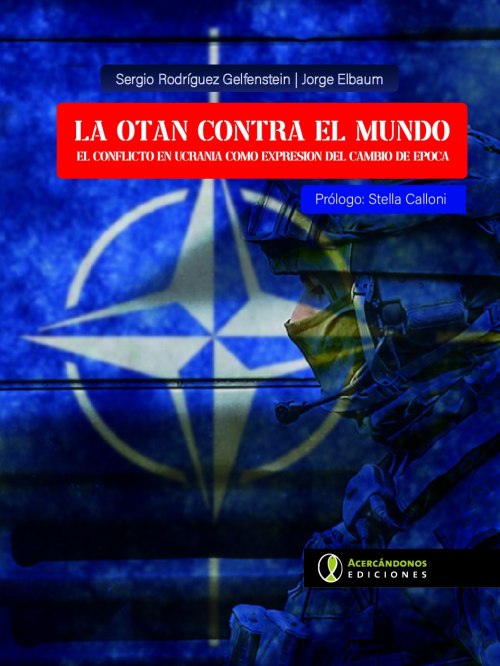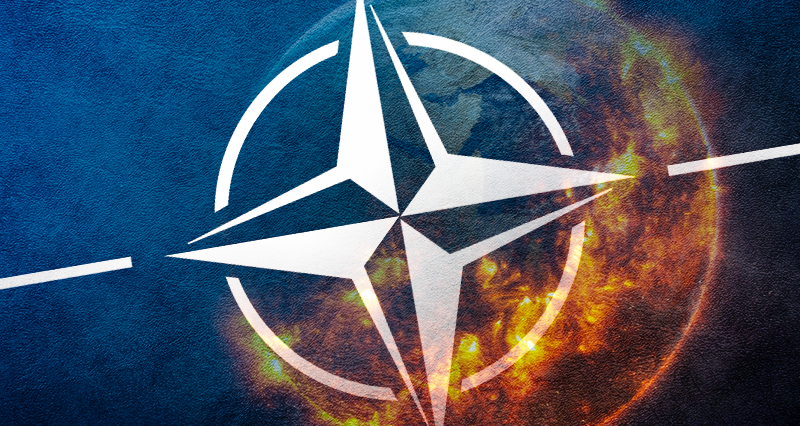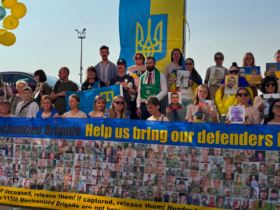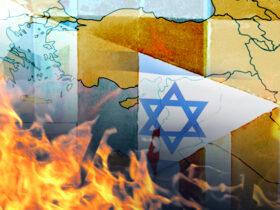By Sergio Rodríguez Gelfenstein *
During my recent visit to Argentina and Uruguay, the institutions sponsoring my trip organized a tour where we made 14 presentations of the book “NATO against the world”, that I wrote together with Jorge Elbaum. There were also 7 talks and conferences on the subject. In many of them, the attendees reiterated the question as to why the book has the subtitle I now use in this article: “The conflict in Ukraine as an expression of the change of epoch”, and asked for more information on the subject.
Precisely, for Jorge and myself, it was a priority to make known in the book some notes that explained why we had come to the conclusion that – beyond the military results of the conflict – in reality the most transcendent thing was that the main consequence: The verification of the beginning of that change of era that the former Ecuadorian President Rafael Correa spoke about a few years ago.

In the same way, we assumed that this consequence was the one that gave the confrontation a global character, since its aftermath would have an impact on the entire planet. Thus, the conflict was much more than a confrontation of Ukraine against Russia and even of the United States and NATO against Russia.
In the Second World War, the United States waited until the end for a debacle of the Soviet Union against the Nazi army, before bursting in in mid-1944, when the final outcome of the conflict had become indisputable and categorical after the Soviet victory at Stalingrad in February 1943. Unlike that, today, the “new Normandy Landing” expressed as support for the coup in Ukraine in 2014, was the detonator of a war of expansion that has already lasted 8 years.
In the course, the United States not only supported the extermination of the Russian-speaking population of eastern Ukraine, but also cooperated in the beheading of the armed forces of that country to transform it into an enforcement body under the mandate of Nazi organizations. With support of Washington, these forces began the “NATOization” of the Ukrainian armed forces to turn them into a battering ram for the expansion of NATO, a terrorist military structure that threatens all of humanity.
The obligatory Russian response to safeguard the physical integrity of the inhabitants of the oppressed territories also added as objectives the denazification and demilitarization of Ukraine, thus emulating the objectives agreed upon by the victorious powers in the Second World War with respect to Germany, when they met in the German city of Potsdam between July 17 and August 2, 1945.
At the end of the event, the President of the United States rushed back to Washington to – only 4 days later – order the dropping of an atomic bomb on the inert city of Hiroshima when Japan had already surrendered. In this way, he subordinated – by means of the most horrible event in the history of mankind – the surrendered and disarmed Japanese empire, which to this day has remained attached to the military and political apparatus of the United States.
With Europe, the United States was more subtle: it resorted to buying the will of the European elites by creating the so-called Marshall Plan, an instrument more susceptible than the atomic bomb to be publicized by Hollywood as an expression of American “cooperative values”. But the purpose was the same. Thus, Europe became a useful tool in Washington’s quest to dominate the world.
The system that began to take shape after the Nazi defeat at Stalingrad, and which was agreed at the summit conferences of Teheran (1943), Yalta, the Soviet Union and Potsdam (1945), bore the stamp of the American imprint after Hiroshima and Nagasaki. The financial architecture of the post-war world was agreed upon in Dumbarton Oaks, USA in the summer of 1944 while the political system saw the light of day in San Francisco, also in the USA, in October 1945.
The now collapsing world
This is the world that is now collapsing, because it has not been able to guarantee peace, equity and justice for all the peoples of the planet. On the contrary, it has been unable to prevent the fact that there are still 2.8 billion poor people, 35% of the world’s population, while 2.2 billion citizens (27.8%) do not have access to water and 1.8 billion (22.7%) are homeless. All this in a world that spends $2.11 trillion annually on weapons, 46.4% of which by the United States.
Such resources would be enough to solve the three existential scourges of humanity (lack of food, water and housing), which were nevertheless enshrined as rights in the UN Charter. It was not even possible to coordinate efforts to combat the Covid19 pandemic, a unified enemy that affected and attacked the whole of humanity. The capitalist interests of profit, gain and wealth took precedence as an absolute value, even superior to the safeguarding of human life itself. Such a system must not continue to exist, it must be abolished and overcome.
For five centuries, the Atlantic Ocean and in particular Europe has been the space where world power has been concentrated. The emergence of the United States as an imperialist power at the end of the 19th century began to resize this dominance. The two shores of the North Atlantic became the place where decisions were made. This was definitively established after the purchase of Europe by the United States, as mentioned above.
But unlike the political and economic spheres in which a consensus seemed to have been reached in the post-war period, there was no consensus in the military and security spheres, so the United States created the North Atlantic Organization (NATO) in 1949. This meant the military occupation of Europe by peaceful means and the obligation of the countries of the Old Continent to pay Washington to provide security. In fact, Europe became a continent occupied by the U.S. Armed Forces. It remains so to this day.
But after the disappearance of the Soviet Union, the United States – and its instrument NATO – did not stop its impetus for world domination and began to expand first towards Eastern Europe and more recently to Asia Pacific and Latin America using Colombian territory for that purpose, after the debacle that meant for Washington the end of its control of the Panama Canal Zone and the dismantling of the Southern Command in that area in compliance with the Torrijos-Carter agreements which obliged it to withdraw its soldiers from the isthmus by December 31, 1999 at the latest.
This process of expansion, control and world domination, which without the counterweight of the existence of the Soviet Union was carried out without pause during the last three decades, came to a halt when the West directly threatened the security of Russia, another nuclear power that could not allow the establishment of NATO on its borders, the transformation of Ukraine – run by a Nazi Zionist government – into a sharp instrument of that policy and the intention to install atomic weapons in that territory, to endanger its integrity and sovereignty. To fulfill the task entrusted by Washington, the Ukrainian government set about exterminating the Russian-speaking population living in the territories bordering Russia and who rejected the 2014 coup d’état by initiating a war of resistance in favor of their survival without Europe, the UN or the “international system” expressing any rejection of what was evidently genocide.
The inevitable response of February 24 this year by Russia has finished shaping the dynamics generated by the events from 2014 when NATO began to create the conditions for a war against Russia. In retaliation, the West has agreed to eight rounds of sanctions despite the fact that already from the first ones, there were worse repercussions for those imposing sanctions than for the sanctioned.
Eurasian lands as the new main sphere of world power
It is in this context that the new era and the new world we are talking about is taking shape. In the first place, the main sphere of world power is ceasing to be the North Atlantic and is beginning to establish itself in the great Eurasian land space in which the United States has no interference. It tried to do so in 2001 by militarily invading Afghanistan under the subterfuge of the “war on terror” but after 20 years of occupation of that country, it was forced to flee in shameful defeat, just as it had done in Vietnam 46 years earlier. More recently he pretended to stage a coup in Kazakhstan in April this year and failed in the same way as when he used similar expedient in January 2021 in Kyrgyzstan. Now, it is resorting to stirring up conflicts between former Soviet Union countries that did not bother to precisely delimit their boundaries when they were part of the great Eurasian state.
Nevertheless, Eurasia is making progress in the construction of instruments of cooperation and integration without U.S. interference and using forms and methods that do not seek subjugation and underdevelopment while guaranteeing peace based on respect for self-determination and sovereignty. Emblematic instruments have been the Silk Road and the Silk Belt, but also the Eurasian Economic Union (EEU), the Eastern Economic Forum, the International North-South Transport Corridor (INSTC) in the economic sphere; as well as the Shanghai Cooperation Organization (SCO) and the Collective Security Treaty Organization (CSTO) in the security sphere, and the Commonwealth of Independent States (CIS) in the political sphere. The United States is not a member of any of them, while the most comprehensive of them all, the Silk Road, is already made up of almost 100 countries from all continents.
In a broader context, the BRICS (which already have a GDP greater than that of the G-7, the conglomerate grouping the 7 largest capitalist economies) has received expressions of willingness from 11 countries to join, several of them strong allies of the United States, including Türkiye, a NATO member. In this sense, the United States was not even able to obtain a resolution rejecting the Russian military operation in Ukraine at the G-20 ministerial meeting held in Bali, Indonesia last July, which concluded without a final declaration as an expression of the division existing in this organization quasi-controlled by the United States in the past.
On the other hand, several US allied nations, some with important political and/or economic weight at a global level, such as Brazil, Egypt, Indonesia, Saudi Arabia, Türkiye, Malaysia, Qatar, the United Arab Emirates and Mexico, among others, have refused to abide by the Western sanctions policy against Russia.
Perhaps, as relevant breaking news expressing this change of era, it would be worth saying that Russia and Saudi Arabia reached an agreement to counteract the oil price cap decided by the European Union (EU) as a result of which OPEC+ will cut production by 2 million barrels per day to increase the price and thus compensate for this cap decreed by the EU as part of its eighth package of sanctions against Russia for its military operation in Ukraine. As a sign of Washington’s inability to continue to set the basis for the functioning of the planet, it is necessary to quote the statement of the U.S. government in response to the aforementioned fact: “President [Biden] is disappointed by OPEC+’s short-sighted [sic] decision to cut its production quotas while the global economy is dealing with the continuing negative impact of Putin’s invasion in Ukraine”.
Needless to say, while Biden is disappointed and the peoples of Europe are suffering from the consequences of the sanctions their governments have agreed to against Russia, the world is moving towards a new configuration. Once again, as in World War II it has fallen to Russia to bear the main responsibility for such an event, once again the Russian people – on the battlefields – are sacrificing the lives of their best men and women to save humanity from fascism, Nazism and imperialist expansion.
* Sergio Rodríguez Gelfenstein is a Venezuelan international relations expert, who was previously Director of the International Relations of the Presidency of the Bolivarian Republic of Venezuela, his country’s ambassador to Nicaragua and an advisor for international politics for TELESUR. Gelfenstein has written numerous books, among them “China in the XXI Century – the awakening of a giant” which has been published in several Latin American countries.

















Leave a Reply